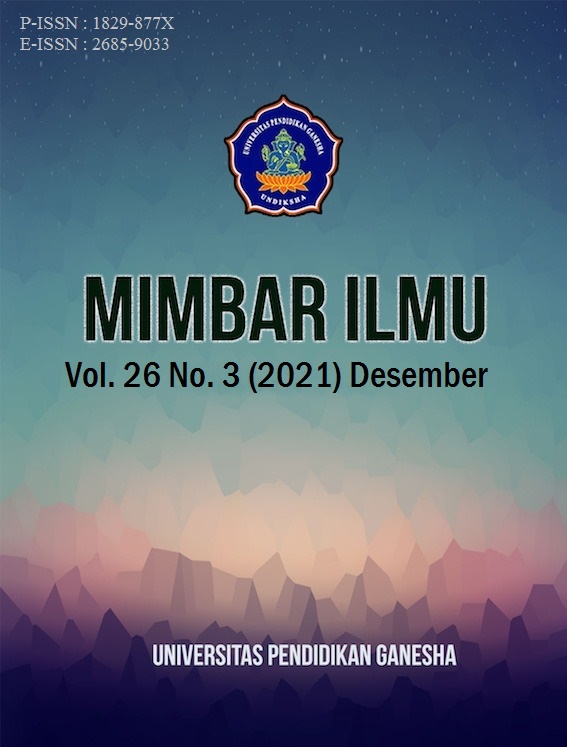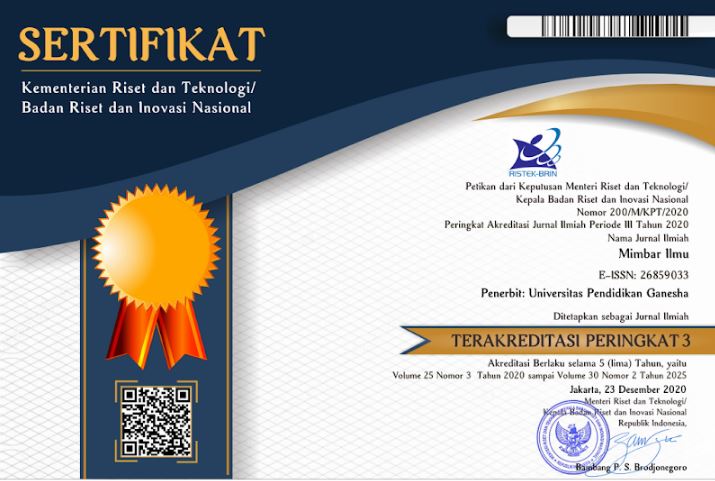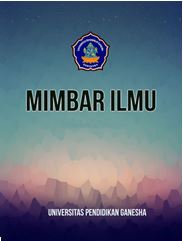Meningkatkan Hasil Belajar Mahasiswa Melalui E-Modul Berbasis Android
DOI:
https://doi.org/10.23887/mi.v26i3.39008Keywords:
E-modul, Android, Hasil BelajarAbstract
Mahasiswa dalam pembelajaran daring kurang termotivasi untuk belajar mandiri dikarenakan proses pembelajaran yang monoton. Hal berimbas kepada mahasiswa mengalami kesulitan dalam memahami materi Food Control dikarenakan keterbatasan sumber belajar yang tersedia. Tujuan dari penelitian ini adalah untuk mengembangkan E-modiul berbasis Android pada mata kuliah Food Control yang valid, praktis dan efektif. Jenis penelitian ini yaitu pengembangan. Metode penelitian yang digunakan adalah Research and Development (R&D) dengan prosedur pengembangan 4-D (Define, Design, Develop, Desseminate). Subjek penelitiannya adalah mahasiswa yang berjumlah 29 orang Metode yang digunakan untuk mengumpulkan data yaitu wawancara, observasi, kuesioner, dan tes. Instrument yang digunakan untuk mengumpulkan data yaitu kuesioner dan lembar tes. Teknik yang digunakan untuk menganalisis data yaitu statistic deskriptif kualitatif dan kuantitatif. Hasil yang diperoleh dari penelitian pengembangan ini adalah e-modul berbasis Android sudah efektif dilihat berdasarkan hasil belajar mahasiswa. Berdasarkan perbedaan hasil pre test dan post test dengan ketuntasan klasikal sebesar 96,55 %. Dapat disimpulkan bahwa e-modul layak diterapkan dalam proses pembelajaran dan efektif meningkatkan hasil belajar mahasiswa. Berdasarkan temuan penelitian ini disimpulkan bahwa e-modul berbasis Android dinyatakan efektif untuk dimanfaatkan sebagai sumber belajar pendukung pembelajaran daring pada mata kuliah Food Control. Implikasi penelitian ini yaitu E-modul dapat diterapkan oleh dosen untuk mengatasi mahasiswa yang kesulitan dalam belajar.
References
Abidah, A., Hidaayatullaah, H. N., Simamora, R. M., Fehabutar, D., & Mutakinati, L. (2020). The Impact of Covid-19 to Indonesian Education and Its Relation to the Philosophy of “Merdeka Belajar.” Studies in Philosophy of Science and Education, 1(1), 38–49. https://doi.org/10.46627/sipose.v1i1.9.
Aprilia, I., & Suryadarma, I. G. P. (2020). E-Module of Mangrove Ecosystem (EMME): Development, Validation, and Effectiveness in Improving Students’ Self-Regulated. Biosfer : Jurnal Pendidikan, 13(1), 114–129. https://doi.org/10.21009/biosferjpb.v13n1.114-129.
Asmi, A. R., Dhita Surbakti, A. N., & C., H. (2018). E-Module Development Based Flip Book Maker For Character Building In Pancasila Coursework Sriwijaya University. Jurnal Pendidikan Ilmu Sosial, 27(1), 1–10. https://doi.org/10.17509/jpis.v27i1.9395.
Aufa, M. N., Rusmansyah, R., Hasbie, M., Jaidie, A., & Yunita, A. (2021). The Effect of Using e-module Model Problem Based Learning (PBL) Based on Wetland Environment on Critical Thinking Skills and Environmental Care Attitudes. Jurnal Penelitian Pendidikan IPA, 7(3), 401–407. https://doi.org/10.29303/jppipa.v7i3.732.
Candra Lestari, N. P. (2018). Penerapan Model Pembelajaran Kooperatif Tipe Nht Berbantuan Media Audio Visual Untuk Meningkatkan Hasil Belajar IPA. Journal of Education Action Research, 2(4), 355. https://doi.org/10.23887/jear.v2i4.16331.
Cloonan, M. R., Cloonan, D. J., Schlitzkus, L. L., & Fingeret, A. L. (2020). Learners with Experience in Surgical Scrub Benefit from Additional Education with an Interactive E-Learning Module. Journal of the American College of Surgeons, 4(2). https://doi.org/10.1016/j.jamcollsurg.2020.08.521.
Darmayasa, I. K., Jampel, N., Simamora, A. H., & Pendidikan, J. T. (2018). Pengembangan E-Modul Ipa Berorientasi Pendidikan Karakter di SMP Negeri 1 Singaraja. Jurnal Edutech Undiksha, 6(1), 53–65. https://doi.org/10.23887/jeu.v6i1.20267.
Devi, S., Bhat, Ks., Ramya, S., Ravichandran, K., & Kanungo, R. (2016). Self-directed learning to enhance active learning among the 2nd -year undergraduate medical students in Microbiology: An experimental study. Journal of Current Research in Scientific Medicine, 2(2), 80–83. https://doi.org/10.4103/2455-3069.198379.
Dewa, E., Maria Ursula Jawa Mukin, & Oktavina Pandango. (2020). Pengaruh Pembelajaran Daring Berbantuan Laboratorium Virtual Terhadap Minat dan Hasil Belajar Kognitif Fisika. JARTIKA Jurnal Riset Teknologi Dan Inovasi Pendidikan, 3(2), 351–359. https://doi.org/10.36765/jartika.v3i2.288.
Faridah, A., & Santi, T. D. (2021). Praktikalitas dan Efektivitas Pengembangan Mobile Learning Berbasis Moodle pada Mata Pelajaran Pengetahuan Bahan Makanan di Sekolah Menengah Kejuruan. Edukatif: Jurnal Ilmu Pendidikan, 3(5), 2194–2199.
Febliza, A., & Okatariani, O. (2020). The Development of Online Learning Media by Using Moodle for General Chemistry Subject. Journal of Educational Science and Technology (EST), 6(1), 40. https://doi.org/10.26858/est.v6i1.12339.
Fisnani, Y., Utanto, Y., & Ahmadi, F. (2020). The Development of E-Module for Batik Local Content in Pekalongan Elementary School. Innovative Journal of Curriculum and Educational Technology, 9(1), 40–47. https://doi.org/10.15294/IJCET.V9I1.35592.
Fitriyani, Y., Fauzi, I., & Sari, M. Z. (2020). Motivasi Belajar Mahasiswa Pada Pembelajaran Daring Selama Pandemik Covid-19. Profesi Pendidikan Dasar, 7(1), 121–132. https://doi.org/10.23917/ppd.v7i1.10973.
Fortuna, A. P., Rida, A. M., Maharani, L. S. P., Ardiansyah, R., & Sari, A. A. (2020). A needs analysis of digital connecting book in education in the pandemic era. ACM International Conference Proceeding Series. https://doi.org/10.1145/3452144.3452154.
Hamid, S. N. M., Lee, T. T., Taha, H., Rahim, N. A., & Sharif, A. M. (2021). E-Content Module For Chemistry Massive Open Online Course (Mooc): Development And Students’ Perceptions. Journal of Technology and Science Education, 11(1), 67–92. https://doi.org/10.3926/jotse.1074.
Hamzah, I., & Mentari, S. (2017). Development of Accounting E-Module to Support the Scientific Approach of Students Grade X Vocational High School. Journal of Accounting and Business Education, 1(1), 78. https://doi.org/10.26675/jabe.v1i1.9751.
Irwansyah, F. S., Lubab, I., Farida, I., & Ramdhani, M. A. (2017). Designing Interactive Electronic Module in Chemistry Lessons. Journal of Physics: Conference Series, 895(1). https://doi.org/10.1088/1742-6596/895/1/012009.
Jang, M., Aavakare, M., Nikou, S., & Kim, S. (2021). The Impact of Literacy on Intention to Use Digital Technology for Learning: A Comparative Study of Korea and Finland. Telecommunications Policy, 45(7). https://doi.org/10.1016/j.telpol.2021.102154.
Laksana, D. N. L. (2020). The Implementation Of Online Learning During COVID-19 Pandemic: Student Perceptions In Areas With Minimal Internet Access. Journal of Education Technology, 4(4), 502–509. https://doi.org/10.23887/jet.v4i4.29413.
Logan, R. M., Johnson, C. E., & Worsham, J. W. (2021). Development of an E-learning Module to Facilitate Student Learning and Outcomes. Teaching and Learning in Nursing, 16(2), 139–142. https://doi.org/10.1016/j.teln.2020.10.007.
Lyashenko, M. S., & Malinina, I. A. (2015). The Use of Learning Management System Projects for Teaching a Foreign Language in the University. Procedia - Social and Behavioral Sciences, 182, 81–88. https://doi.org/10.1016/j.sbspro.2015.04.741.
Mastroleo, N. R., Humm, L., Williams, C. M., & Kiluk, B. D. (2020). Initial Testing of a Computer-Based Simulation Training Module to Support Clinicians’ Acquisition of CBT Skills for Substance use Disorder Treatment. Journal of Substance Abuse Treatment, 114. https://doi.org/10.1016/j.jsat.2020.108014.
Ningsih, S. Y, & Mahyuddin, N. (2021). Desain E-Module Tematik Berbasis Kesantunan Berbahasa Anak Usia Dini di Taman Kanak-Kanak. Jurnal Obsesi : Jurnal Pendidikan Anak Usia Dini, 6(1), 137–149. https://doi.org/10.31004/obsesi.v6i1.1217.
Ningsih, Sri Yunimar, & Mahyuddin, N. (2021). Desain E-Module Tematik Berbasis Kesantunan Berbahasa Anak Usia Dini di Taman Kanak-Kanak. Jurnal Obsesi : Jurnal Pendidikan Anak Usia Dini, 6(1), 137–149. https://doi.org/10.31004/obsesi.v6i1.1217.
Onyema, E. M. (2020). Impact of Coronavirus Pandemic on Education. Journal of Education and Practice, 11(13), 108–121. https://doi.org/10.7176/jep/11-13-12.
Padmadewi, N. N. (2015). Pengembangan Perangkat Pembelajaran Berbasis Pendidikan Karakter Untuk Mata Kuliah Strategi Pembelajaran Bahasa Jurusan Pendidikan Bahasa Jepang Di Universitas Pendidikan Ganesha Singaraja. JPI (Jurnal Pendidikan Indonesia), 4(1), 540–555. https://doi.org/10.23887/jpi-undiksha.v4i1.4893.
Pratama, G. S., & Retnawati, H. (2018). Urgency of Higher Order Thinking Skills (HOTS) Content Analysis in Mathematics Textbook. Journal of Physics: Conference Series, 1097(1). https://doi.org/10.1088/1742-6596/1097/1/012147.
Puspitarini, Y. D., & Hanif, M. (2019). Using Learning Media to Increase Learning Motivation in Elementary School. Anatolian Journal of Education, 4(2), 53–60. https://doi.org/10.29333/aje.2019.426a.
Raharjo, M. W. C., Suryati, S., & Khery, Y. (2017). Pengembangan E-Modul Interaktif Menggunakan Adobe Flash Pada Materi Ikatan Kimia Untuk Mendorong Literasi Sains Siswa. Hydrogen: Jurnal Kependidikan Kimia, 5(1), 8. https://doi.org/10.33394/hjkk.v5i1.102.
Sahin, D., & Yilmaz, R. M. (2020). The effect of Augmented Reality Technology on middle school students’ achievements and attitudes towards science education. Computers & Education, 144. https://doi.org/10.1016/j.compedu.2019.103710.
Setianingsih, I. G. A. A. A., Putra, D. K. N. S., & Kt.Ardana, I. (2019). Pengaruh Model Pembelajaran Reciprocal Teaching Berbantuan Media Audio Visualterhadap Kompetensi Pengetahuan IPA. Journal of Education Technology, 3(3), 203–209. https://doi.org/10.23887/jet.v3i3.21827.
Sidiq, R., & Najuah. (2020). Pengembangan E-Modul Interaktif Berbasis Android Pada Mata Kuliah Strategi Belajar Mengajar. Jurnal Pendidikan Sejarah, 9(1), 1–14. https://doi.org/10.21009/JPS.091.01.
Slovaček, K. A., & Čosić, G. (2020). The Role of Parents during the COVID19 Pandemic in Croatia. Studies in Educational Management, 8(8), 9–17. https://doi.org/10.32038/sem.2020.08.02.
Sofyan, H., Anggereini, E., & Saadiah, J. (2019). Development of E-Modules Based on Local Wisdom in Central Learning Model at Kindergartens in Jambi City. European Journal of Educational Research, 8(4), 1137–1143. https://doi.org/10.12973/eu-jer.8.4.1137.
Sriyanti, I., Almafie, M. R., Marlina, L., & Jauhari, J. (2021). The effect of Using Flipbook-Based E-modules on Student Learning Outcomes. Kasuari: Physics Education Journal (KPEJ), 3(2), 69–75. https://doi.org/10.37891/kpej.v3i2.156.
Suarsana, I. M., & Mahayukti, G. A. (2013). Pengembangan E-Modul Berorientasi Pemecahan Masalah Untuk Meningkatkan Keterampilan Berpikir Kritis Mahasiswa. Jurnal Nasional Pendidikan Teknik Informatika (JANAPATI), 2(3), 193. https://doi.org/10.23887/janapati.v2i3.9800.
Subarkah, C. Z., Alhak, A. A., Sari, S., Ruswandi, U., & Rochman, C. (2021). Developing E-module on the Topic of Integrated Addictive Substances with Islamic Values. JTK (Jurnal Tadris Kimiya), 6(1), 16–25. https://doi.org/10.15575/jtk.v6i1.9802.
Sunismi, S., & Fathani, A. H. (2016). Uji Validasi E-Module Matakuliah Kalkulus I untuk Mengoptimalkan Student Centered Learning dan Individual Learning Mahasiswa S-1. Jurnal Review Pembelajaran Matematika, 1(2), 174–191. https://doi.org/10.15642/jrpm.2016.1.2.174-191.
Surata, I. K., Sudiana, I. M., & Sudirgayasa, I. G. (2020). Meta-Analisis Media Pembelajaran pada Pembelajaran Biologi. Journal of Education Technology, 4(1), 22–27. https://doi.org/10.23887/jet.v4i1.24079.
Susilowati, E., & Azzasyofia, M. (2020). The parents stress level in facing children study from home in the early of covid-19 pandemic in Indonesia. International Journal of Science and Society, 2(3), 1–12. https://doi.org/10.200609/ijsoc.v2i3.117.
Syarifudin, A. S. (2020). Impelementasi Pembelajaran Daring Untuk Meningkatkan Mutu Pendidikan Sebagai Dampak Diterapkannya Social Distancing. Jurnal Pendidikan Bahasa Dan Sastra Indonesia Metalingua, 5(1), 31–34. https://doi.org/10.21107/metalingua.v5i1.7072.
Tiwery, W. Y., Patty, F. N., & Nanlohy, D. F. (2021). Role Of Family For Children’s Education During A Pandemic In Eastern Indonesia. Turkish Journal of Computer and Mathematics Education (TURCOMAT), 12(7), 1522–1527. https://doi.org/10.17762/turcomat.v12i7.2965.
Triwahyuningtyas, D., Ningtyas, A. S., & Rahayu, S. (2020). The problem-based learning e-module of planes using Kvisoft Flipbook Maker for elementary school students. Jurnal Prima Edukasia, 8(2), 199–208. https://doi.org/10.21831/jpe.v8i2.34446.
Winatha, K. R., Naswan, S., & Ketut, A. (2018). Pengembangan E-modul Interaktif Berbasis Proyek Pada Mata Pelajaran Simulasi Digital Kelas X di SMK TI Bali Global Singaraja. Jurnal Teknologi Pembelajaran Indonesia, 8(1). https://doi.org/10.23887/jtpi.v8i1.2238.
Wungguli, D., & Yahya, L. (2020). Pengaruh Penggunaan Media Berbasis Information and Communication Technology (ICT) terhadap Hasil Belajar Siswa pada Materi Dimensi Tiga. Jambura Journal of Mathematics Education, 1(1), 41–47. https://doi.org/10.34312/jmathedu.v1i1.5376.
Yusuf Siregar, M., & Amiril Akbar, S. (2020). Strategi guru dalam meningkatkan kualitas mengajar selama masa Pandemi COVID-19. At- Tarbawi, 12(2), 180–188. https://doi.org/10.32505/tarbawi.v12i2.1832.
Downloads
Published
How to Cite
Issue
Section
License
This work is licensed under a Creative Commons Attribution-ShareAlike 4.0 International License.
Authors who publish with this journal agree to the following terms:
- Authors retain copyright and grant the journal right of first publication with the work simultaneously licensed under a Creative Commons Attribution License that allows others to share the work with an acknowledgment of the work's authorship and initial publication in this journal.
- Authors are able to enter into separate, additional contractual arrangements for the non-exclusive distribution of the journal's published version of the work (e.g., post it to an institutional repository or publish it in a book), with an acknowledgment of its initial publication in this journal.
- Authors are permitted and encouraged to post their work online (e.g., in institutional repositories or on their website) prior to and during the submission process, as it can lead to productive exchanges, as well as earlier and greater citation of published work.









